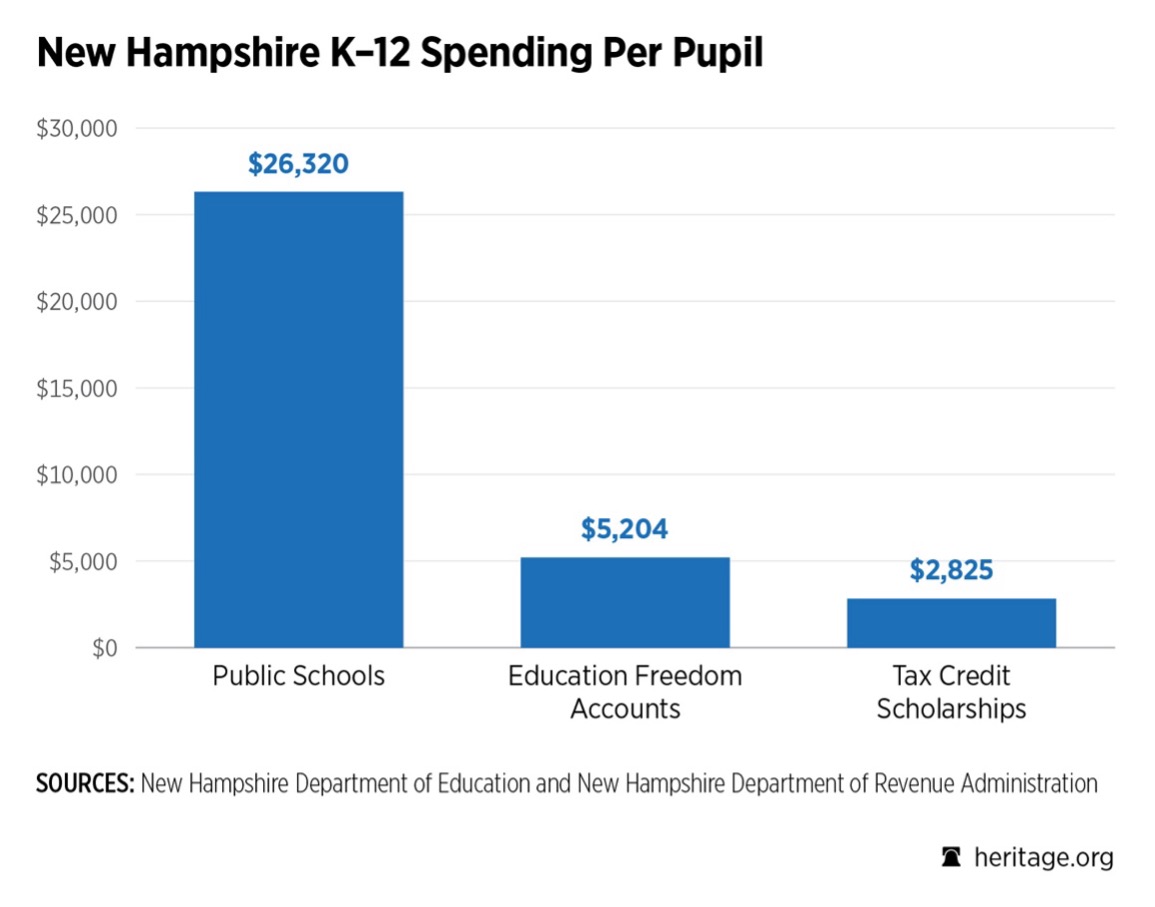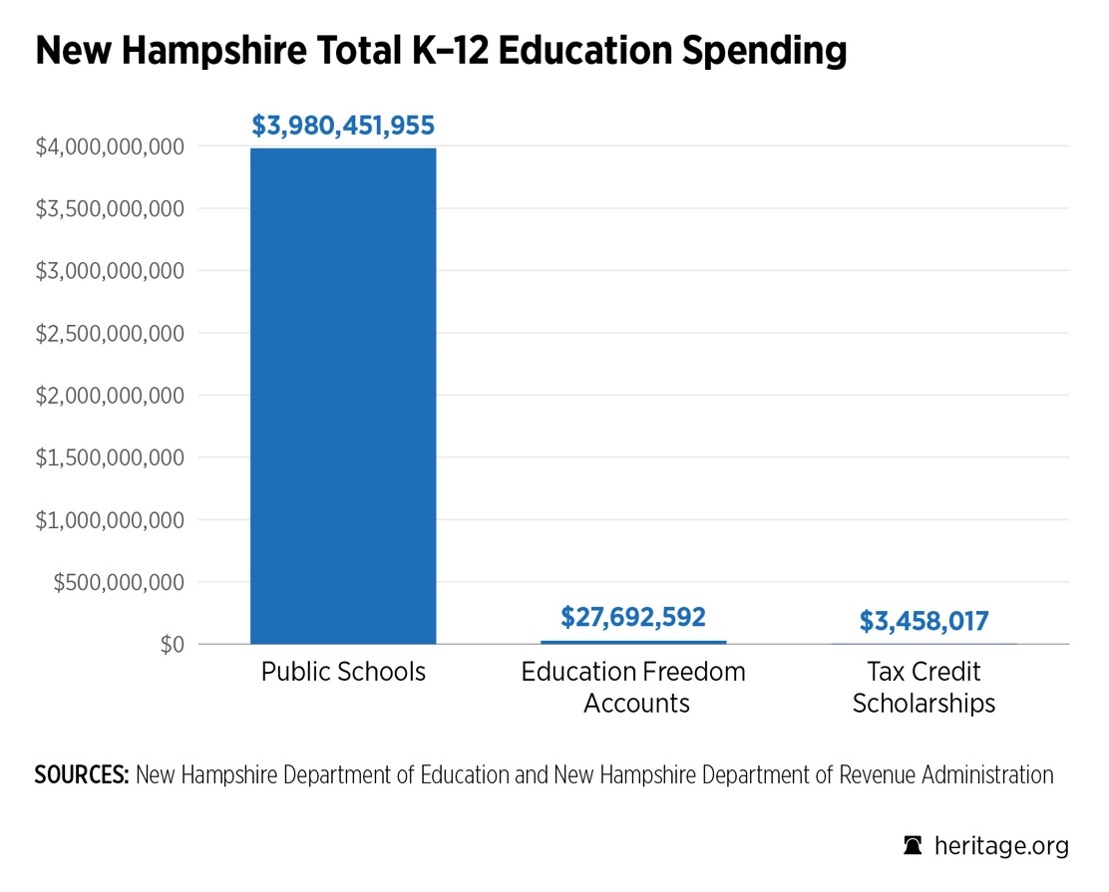The Live Free or Die State has long been a leader in education freedom and choice. New Hampshire’s Education Freedom Accounts (EFA) policy was among the first in the nation to empower families with the freedom and flexibility to customize their child’s education. But in recent years, 16 other states have made similar policies available to all K-12 students, while fewer than half of Granite State students are eligible.
New Hampshire now has the opportunity to reclaim the mantle of leadership by expanding eligibility for EFAs to all students. Both the New Hampshire Senate and House of Representatives have passed bills that take slightly different paths to the same goal: universal education choice.
The promise of public education is that every child should have access to a learning environment that meets his or her individual learning needs. However, no one school is the best fit for every child who just happens to live nearby.
At its core, education is a deeply personal journey. No two children learn exactly the same way, nor do all families share the same goals, values, or challenges. Despite this, our current education system often forces families into a one-size-fits-all model based on geography rather than fit or effectiveness. While New Hampshire has made strides with its Education Freedom Accounts, the promise of public education will not be fulfilled until every child gets access to them.
>>> The Conservative Vision of Education
Parents are the primary educators of their children. They love their children most and know their children’s strengths, challenges, and aspirations better than any bureaucrat or school board. To deny them the ability to choose the best educational environment is to deny their most basic role. It is not the state’s job to dictate what education looks like for each family, but to empower families with the resources and flexibility to make those decisions themselves.
Opponents of school choice know that they’ve lost the argument. Now they’re just trying to limit its scope, calling it “welfare for the wealthy,” as Sen. Debra Altschiller (D-Stratham) did recently. Likewise, Rep. David Meuse (D-Portsmouth) argued that making the EFAs available to all would “give the most affluent families in the state — people whose kids are already mostly in private schools — an early holiday gift.”
But what the critics fail to mention is that New Hampshire taxpayers already pay for the education of children from wealthy families at public schools—much more, in fact. According to the New Hampshire Department of Education, the average cost per pupil at public schools statewide is $26,320. By contrast, the average EFA award is only about $5,200.

If the critics were really upset that a well-off family with four school-aged children received $28,000 in taxpayer support for their education, then they should be even more upset that the same family would receive more than $105,000 in taxpayer support at a public school. Yet no one is calling for income caps on access to public schools because they understand that the public education means education for all.
Other critics have argued that expanding the EFAs to all is just too expensive. After all, it would mean that many families who are already paying out-of-pocket for private education would now get access to an EFA.
Setting aside that this argument is an affront to families who are already sacrificing for their children’s education while paying taxes to subsidize the education of others, the cost concerns are overblown.
Critics have claimed that the EFA expansion would cost more than $100 million in its first year, but their estimates are based on a slew of unrealistic assumptions—such as that every eligible child would take an EFA—which have not materialized in other states. A more reasonable analysis by the Josiah Bartlett Center and EdChoice estimated a fiscal impact on the state budget of about $6.5 million in the first year after the expansion and about $11 million in the second year. For context, the EFA program cost about $27 million last year, which is only about 0.7 percent of the nearly $4 billion spent on New Hampshire’s public schools.

Even with the added costs, EFA spending is barely a drop in the bucket—but it makes a world of difference to the students who get access to learning environments that work for them.
>>> No, We Don’t Need the Department of Education After All
Granite Staters value limited government and individual responsibility. Education choice aligns with that cultural and moral ethos by shifting the locus of control in education from politicians and bureaucrats to families. New Hampshire entrusts its citizens with decisions about their businesses, property, and healthcare. Why treat education differently? A system that imposes educational conformity in a state that treasures freedom and self-determination contradicts the Live Free or Die spirit.
Gov. Kelly Ayotte has made clear that it is time to expand education freedom to all.
“I believe that parents make the best decisions for their children,” Ayotte stated during her campaign last year. “I’m a strong believer in education freedom, and the reason for that is that every child learns differently. And parents know what is best for their children, and we want to give every child in this state the opportunity to go to the school or the educational setting that is best for them.”
It’s time for New Hampshire to fulfill the promise of public education. The state legislature should seize the opportunity to give every New Hampshire family access to an Education Freedom Account so that every child can receive a quality education that meets his or her needs.
This piece originally appeared in the NH Journal





